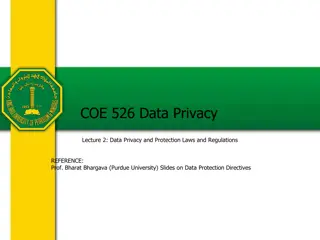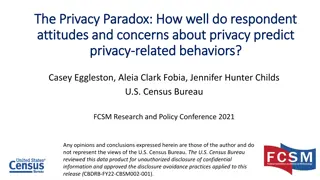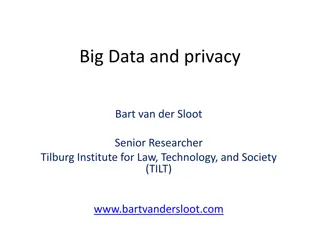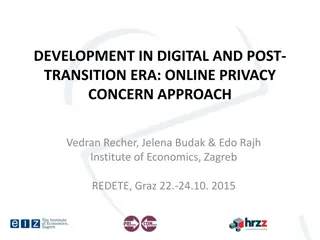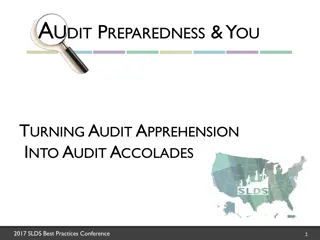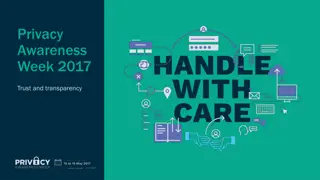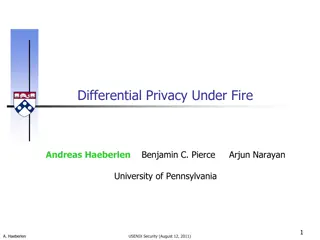The World of Big Brother in Online Privacy
The term "Big Brother" originates from George Orwell's book "1984," symbolizing constant surveillance. Explore its influence in pop culture, technology with algorithms, and legal implications like document dumping. Learn how Internet Service Providers play a vital role in data transmission.
Download Presentation

Please find below an Image/Link to download the presentation.
The content on the website is provided AS IS for your information and personal use only. It may not be sold, licensed, or shared on other websites without obtaining consent from the author.If you encounter any issues during the download, it is possible that the publisher has removed the file from their server.
You are allowed to download the files provided on this website for personal or commercial use, subject to the condition that they are used lawfully. All files are the property of their respective owners.
The content on the website is provided AS IS for your information and personal use only. It may not be sold, licensed, or shared on other websites without obtaining consent from the author.
E N D
Presentation Transcript
BIG BROTHER ONLINE PRIVACY
BIG BROTHER : ORIGIN The term Big Brother was first introduced in the George Orwell book 1984 In this book, all activities, including within one's home, were monitored by a video camera by "Big Brother" a.k.a. the state and often reminded that "Big Brother is Watching You"
BIG BROTHER : POP CULTURE Since the book, several TV shows have run referring to this People live their lives in television as part of reality TV CBC show Big Brother is in its 22ndseason (as of 2020)!
BIG BROTHER IN THE WORLD OF ALGORITHMS In the context of technology, the idea of big brother is that everything you do is being tracked In the novel 1984, we could imagine that a team of people monitored all activity Today, we don't need to watch activities. We can record them and then have algorithms analyze them for "interesting" things
DROWNING WITH DATA A common legal tactic is to produce a document dump This means responding to a subpoena (for example) by providing the required documents, but also providing many more documents than needed so that no one can easily sift through all the documents In 2011, the University of North Carolina football team came under investigations related to academic midconduct as well as illegal recruiting tactics. Records were subpoenaed and eventually UNC released much extra information about all the players, including cell phone bills and parking tickets Sources: https://www.dailytarheel.com/article/2011/06/unc_denied_temporary_stay_on_release_of_football_records and https://www.wralsportsfan.com/unc/story/9735819/ With an AI to analyze this sort of data, the document dump would not work
INTERNET Every person who connects to the internet does so through an Internet Service Provider (ISP) Example: Videotron, Bell, TecSavvy The ISP servers the role that the operator used to in telephones. Within a home, you may create a Local Area Network (LAN) so that many computers can share the same connection
ISP ROLE Whenever you access a page on the internet, you send a request from your computer to your ISP to "retrieve the data at google.com" The ISP has a table of records to translate "google.com" into a number It connects to the machine at that number (a machine that Google owns) and forwards your request to "retrieve the data" That computer then sends the data back to you, through the ISP.
ENCRYPTED DATA If a response is sent over https (instead of http), it means that it is encrypted This means that the ISP can not see the contents of the data sent between you and Google However, they can see the metadata of the request, including the url (which they need to have) as well as the size of the response
ACTIVITY (5 MINUTES) Should ISPs be allowed to store this information or required to purge it? If they are required to purge it, what obligation do they have to truly purge it. For example, even if you delete a file from a computer, some remnants may "linger" in the hard drive somewhere. Imagine as a comparison destroying a document by shredding it---if you're not careful, you may leave some remnants of the document unshredded and someone can put the pieces back together.
ROLE OF WEBSITE In addition to the ISP, you are of course sending your information to the website itself They will store your request For example, Google will store your search request They do not necessarily know the IP address of the request, since it came via the ISP However if you are logged in to gmail, then they will know that the request is sent from your account
ACTIVITY (5 MINUTES) Can you think of a non-nefarious reason that Google may want to store all the search requests and results?
ACTIVITY (5 MINUTES) In fact, it's important for improving their search algorithm If I search for "apple pie recipe" and I end up clicking on the result on page 10, then it indicates that their original search results (on pages 1-9) were not good It's useful to know also much other information such as the time of the request, location, etc Data is useful in aggregation
WHO OWNS THE DATA? In our legal system, it is not clearly specified who owns the data Because we send information to these websites, they often treat it as if it is their data This can include selling the data to third parties who often want the information for advertising purposes
EARLIER DETECTION OF ILLNESSES Some of this tracking can be used for positive uses Google may be able to determine sooner than anyone else whether an outbreak of a disease is occurring based on how many people are searching for terms Google Flu Trends was a site created with this very purpose (existed from 2008 to 2015)
INDIVIDUALIZED DATA Google, Facebook, Amazon, etc use individualized data to provide you with Individualized product recommendations Individualized search results Individualized ads Individualized feed These results need to be stored on an individualized level to provide you with the best possible results. However, people using Facebook don't necessarily consent to allowing individualized feeds. Maybe they would prefer a simpler algorithm such as "display the posts of all my friends in reverse chronological order"
INDIVIDUALIZED FEEDS Individualized feeds lead to people having different definitions of the truth. i.e. fake news This is a serious threat. Our society depends on people agreeing at least on some things Very few "things" are actually "real." Mostly they are real because we all (or at least most of us) agree they are money history events
WHO OWNS IT? Should sites such as Google/Facebook/Amazon be allowed/required/forbidden from storing individualized data other than what is strictly necessary? If they store it, should they be allowed/required to provide a "back door" to the government to allow them to access it If they provide a "back door" how can they possibly ensure that no other parties access this "back door"
CONSENT It's possible that I don't mind uploading pictures of myself to the internet But I can upload pictures of other people, including children, who may not consent What if I change my mind later on? Legally, this is what happens with children. Their parents consent to posting their picture on Facebook (parents control consent of their children in most cases). However, the child can't change their mind later on What if my employer/school forces me to use a technology as part of my job/studies?
ACTIVITY: (5 MINUTES) Do you think massive collection of data should exist at all? If yes, please list any guidelines you think are necessary to use this technology safely. If no, please list any sacrifices of forbidding this technology.







